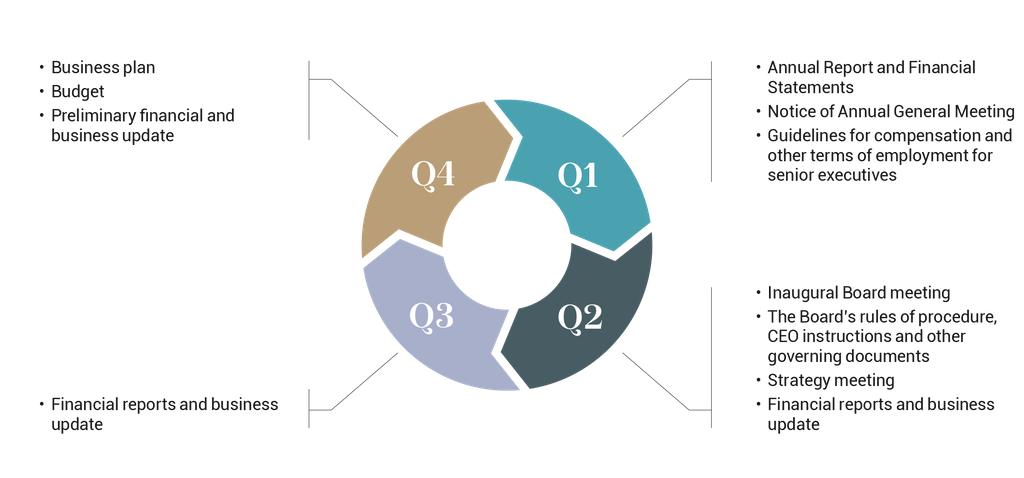The Board of Directors and the committees
The Board of Directors
Hemnet’s Board of Directors is the highest decision-making body after the General Meeting and is the highest executive body. Members of the Board of Directors are appointed annually by the Annual General Meeting for the period until the end of the next Annual General Meeting. According to the company's Articles of Association, the members of the Board of Directors shall consist of between five to nine ordinary members.
The Board of Directors' responsibility is regulated on various levels, mainly in the Swedish Companies Act. Pursuant to the Swedish Companies Act, the Board of Directors is responsible for the company's organisation and the administration of the company's affairs. Furthermore, the Board of Directors shall continuously assess the company's financial position, as well as to ensure that the company's organisation is formed in a way that the accounting, management of funds and the company's financial conditions otherwise are controlled in a secure manner.
Hemnet’s Board of Directors applies the Swedish Code of Corporate Governance, the Remuneration Rules and the Nasdaq Main Market Rulebook. The Board of Director’s work is also regulated by the Articles of Association, instructions form the General Meeting and the Rules of procedure for the Board of Directors. The assignments of the Board of Directors include, among other things, to set objectives and strategies, ensuring that there are effective systems for monitoring and control of the company's operations, and ensuring that there is satisfactory control of the company's compliance with legislation and other regulations applicable to the company's operations. The Board of Directors decides on issues concerning the company's business direction, strategy, business plan, resources and capital structure, organisation, acquisitions, major investments, divestments, annual and interim reports and other general issues of a strategic nature. In addition, the Board of Directors addresses issues and makes decisions regarding other matters considered to be outside the scope of the CEO's authority.
The Board of Directors shall also define appropriate guidelines to govern the company's conduct in society, with the aim of ensuring its long-term value creating ability as well as ensure that the company's disclosure of information is characterised by transparency and is accurate, reliable, relevant and not misleading. In addition, the assignments of the Board of Directors include appointing, evaluating and if necessary removing the CEO.
Hemnet's Board of Directors follows a written Rules of procedure, which has been adopted by the Board and which is reviewed annually. Among other things, the Rules of procedure for the Board of Directors regulates the Board's role and responsibilities, the Board's working methods and how the work is divided within the Board. The Board of Directors has also adopted Instructions for the CEO and Instructions for financial reporting, which constitute appendices to the Rules of procedure for the Board of Directors.
The Board's yearly cycle

Q1
- CEO update
- Financial update
- Annual report and financial statements
- Notice of Annual General Meeting
- Guidelines for compensation and other terms of employment for senior executives
- Decision on quarterly report
- Review of risks
Q3
- CEO update
- Financial update
- Internal control and risk assessment
- Decision on quarterly report
- Strategy meeting
Q2
- CEO update
- Financial update
- Inaugural Board meeting
- The Board’s Rules of Procedure, CEO instruction and other governing documents
- Financial reporting and business update
- Decision on quarterly report
Q4
- CEO update
- Financial update
- Business plan
- Budget
- Preliminary results and business update
- Decision on quarterly report
- Board and CEO valuation
The Board's yearly cycle

The Board's committees
Audit Committee
The Audit Committee is, without otherwise affecting the Board's responsibilities and duties, responsible for monitoring the company's financial reporting and for providing recommendations and proposals to ensure reliable reporting, monitoring the efficiency of the company's internal controls, internal audits, risk assessment and risk management as well as accounting and auditing, including assisting the company's Nomination Committee when preparing the proposal for election of auditor prior to the Annual General Meeting. The Audit Committee also reviews and monitors the auditor's impartiality and independence, and other services provided by the company's auditor.
The current Audit Committee consists of the following members: Maria Redin (Chair), Nick McKittrick, Tracey Fellows and Anders Edmark.
Remuneration Committee
The Remuneration Committee's main tasks are to discuss matters regarding salaries and fees, as well as other terms of employment, pension benefits and other financial benefits such as bonus systems for the CEO and to managers reporting directly to the CEO, and matters regarding remuneration in general. The Remuneration Committee shall also, in due time before each Annual General Meeting, prepare the Board’s proposal for Guidelines regarding remuneration and other terms of employment for the CEO and other executives in the Group’s senior management. The Remuneration Committee shall also prepare and make proposals for the Board’s resolutions regarding remuneration and other terms of employment on an individual basis to the CEO and prepare the remuneration report.
The current Remuneration Committee consists of the following members: Anders Nilsson (Chair), Rasmus Järborg and Håkan Hellström.